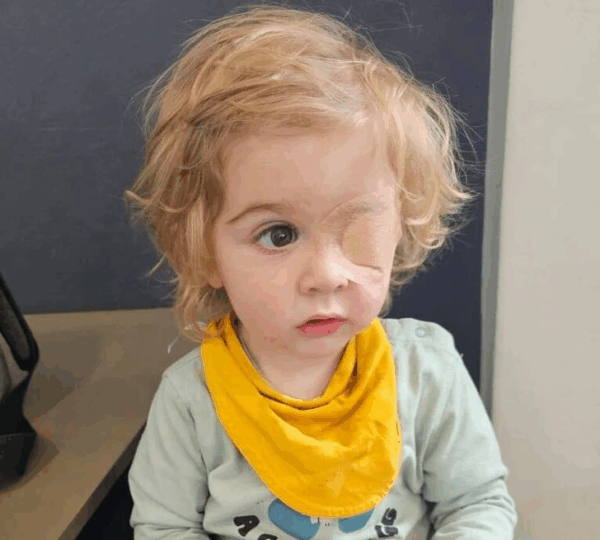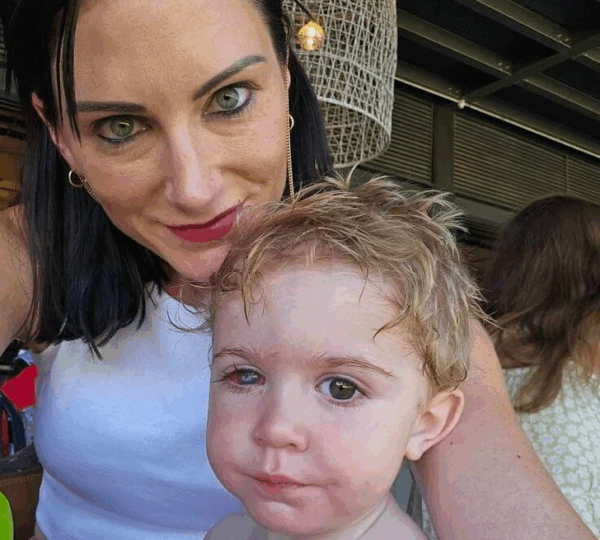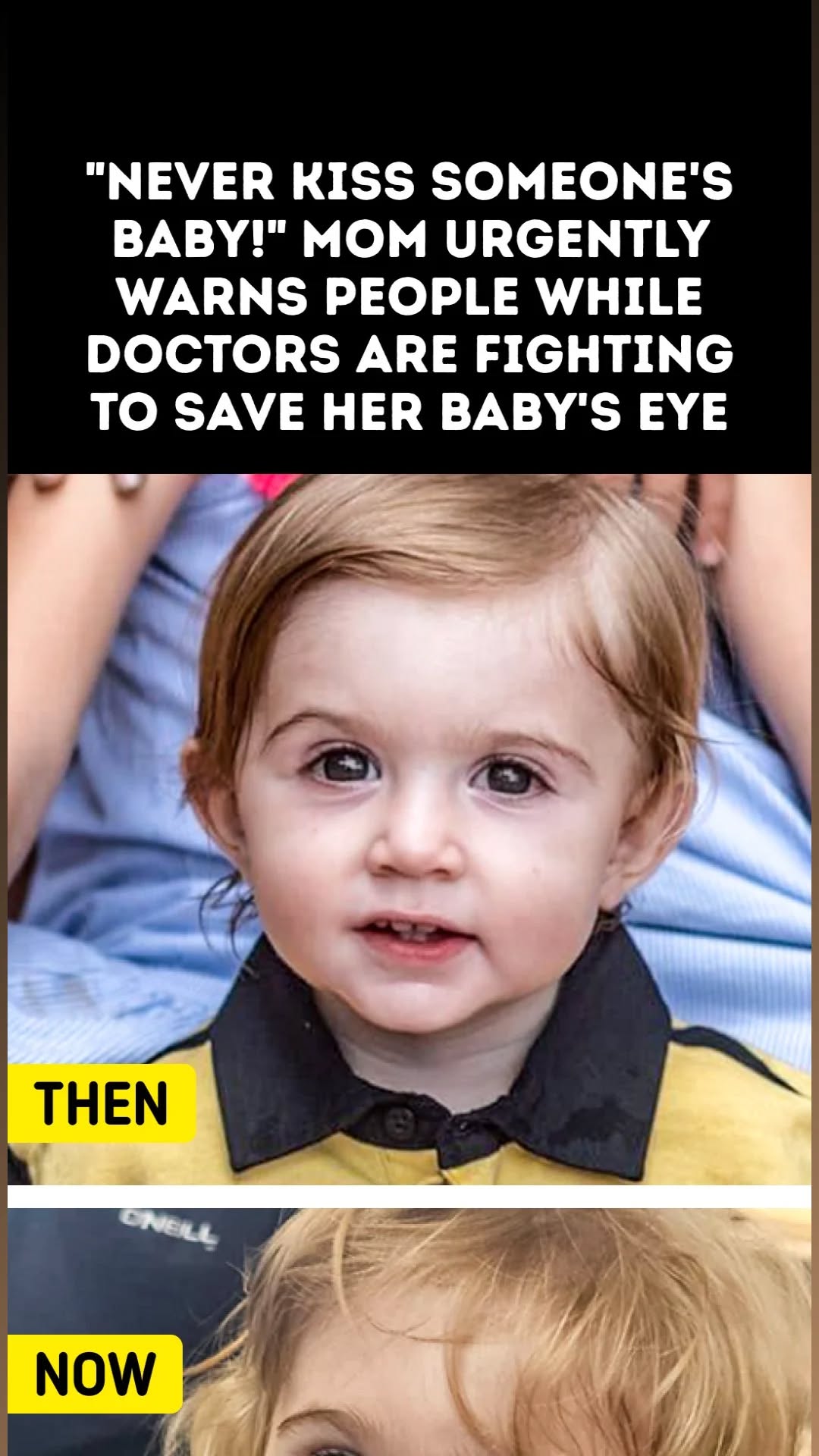
As parents, we often focus on the big dangers that could affect our children’s health—traffic accidents, major illnesses, or serious injuries—while unintentionally overlooking the smaller, everyday risks that might seem harmless but can have devastating consequences. One mother’s harrowing experience serves as a powerful reminder that even the most innocent and well-meaning gestures can sometimes lead to life-threatening complications, especially for infants and toddlers with still-developing immune systems. In a heartfelt and candid post shared on social media, a mother revealed the painful ordeal her family endured after a simple kiss from an adult caused her toddler to develop a severe eye infection. What initially appeared to be a minor eye issue quickly escalated into a medical emergency that put her child’s vision at serious risk. The mother’s decision to share her story publicly is a warning to other parents and caregivers to be vigilant about…
In a heartfelt and candid post shared on social media, a mother revealed the painful ordeal her family endured after a simple kiss from an adult caused her toddler to develop a severe eye infection. What initially appeared to be a minor eye issue quickly escalated into a medical emergency that put her child’s vision at serious risk. The mother’s decision to share her story publicly is a warning to other parents and caregivers to be vigilant about protecting young children from the hidden dangers of viral infections, specifically the herpes simplex virus.
How It All Began: A Simple Kiss Turns Into a Medical Crisis
The incident began innocuously enough, with the child, just one year old, showing signs of a typical eye infection—redness, slight swelling, and discomfort. The family sought medical advice promptly, and their primary care physician prescribed antibiotic eye drops, confident the infection would clear up quickly. For a brief period, it seemed that the treatment was effective, and the family breathed a sigh of relief.

However, within just two days, the child’s condition took a drastic turn for the worse. The mother noticed alarming changes in her toddler’s eye. “It looked like something was growing inside his eyeball—something that wasn’t there the day before,” she recalled. The eye had become increasingly red and swollen, and the child, surprisingly, showed no signs of pain despite frequently scratching at the infected area. The mother’s concern grew when she saw her toddler scratch his eye directly with his finger, seemingly oblivious to any discomfort—a behavior that is highly unusual and indicative of a serious problem.
Alarmed by these symptoms, the family rushed to see eye specialists, who conducted thorough examinations and eventually diagnosed the toddler with an infection caused by the herpes simplex virus type 1 (HSV-1).
Understanding the Hidden Danger of Herpes Simplex Virus
Herpes simplex virus type 1, commonly associated with cold sores or fever blisters around the mouth, is a highly contagious virus that can be transmitted through direct contact with infected saliva or skin. What many people don’t realize is that the virus can be spread even when no visible sores or symptoms are present, making it a silent and dangerous threat, especially to infants.

Babies and young children are particularly vulnerable to HSV-1 because their immune systems are immature and less capable of fighting off infections. In this case, the mother strongly believes that her toddler contracted the virus after being kissed by someone with an active cold sore, despite the gesture being well-intentioned and affectionate. While HSV-1 typically affects the lips and mouth, it can also infect other sensitive areas, including the eyes—a condition known as herpes keratitis. If left untreated, this infection can cause serious damage, including scarring, corneal ulcers, and even permanent vision loss.
In the toddler’s case, the virus caused a significant lesion—a hole approximately 4 millimeters wide—in the cornea, the transparent front part of the eye. This kind of injury is extremely serious and poses a high risk of long-term damage if not managed aggressively and promptly.
The Family’s Nightmare: Fighting the Infection
The diagnosis plunged the family into a terrifying and uncertain situation. The potential complications of ocular herpes include permanent blindness, secondary infections, and in rare but severe cases, the spread of the virus to the brain, which can be fatal. The mother described the ordeal as “the most traumatic experience to look at your baby and literally see a hole in his eye.”
Treatment for herpes keratitis involves antiviral medications—both topical and oral—to suppress the virus and control the infection. The toddler underwent a rigorous treatment regimen under the care of pediatric ophthalmologists and infectious disease specialists. Despite the aggressive treatment, the virus is known for its ability to lie dormant and reactivate periodically, meaning the child faces the ongoing risk of future flare-ups.
In January of the current year, the family traveled to South Africa to consult with a leading pediatric ophthalmologist and undergo specialized surgical interventions. The first of three planned surgeries aimed to stabilize the eye and prevent further deterioration. The second surgery involves a delicate nerve grafting procedure where nerves from the child’s leg will be transplanted to the eye to encourage healing and restore nerve function. The third surgery is planned to attempt the restoration of vision by repairing the cornea and improving eye function.
Despite these advanced medical efforts, the outcome remains uncertain. The family has had to come to terms with the possibility that their child may never regain full vision in the affected eye. “We’ve made peace with the fact that he might be permanently blind in his left eye,” the mother shared with heartbreak and resilience.
Raising Awareness: The Importance of Preventing HSV-1 in Babies
This deeply personal story underscores the critical need for heightened awareness about HSV-1, particularly regarding its transmission to vulnerable infants and young children. Because the virus can be spread through casual contact—such as kissing, sharing utensils, or even touching the baby’s face after touching an infected area—it is essential for parents and caregivers to take proactive measures to minimize risk.
Here are some essential steps parents and families can take to protect their babies from HSV-1 infection:
-
Avoid Kissing Babies if You Have Cold Sores: It may seem affectionate and harmless, but kissing a baby, especially on the lips, when an active cold sore is present can be extremely dangerous. Even kisses on the cheeks, hands, or other areas can transmit the virus, so it is best to refrain completely until the sores have fully healed.
-
Educate Family and Friends: Make sure that all close contacts—relatives, friends, babysitters, and healthcare providers—understand the risks HSV-1 poses to infants. Encourage anyone with a cold sore or suspected herpes infection to avoid close physical contact with babies and young children.
-
Practice Good Hygiene: Hand washing is one of the simplest but most effective ways to reduce the spread of infections. Everyone who interacts with the baby should wash their hands thoroughly before touching the child, especially if they have been in contact with their own or others’ cold sores.
-
Watch for Early Signs: Parents should be vigilant in monitoring their baby for any symptoms of eye infection—such as redness, swelling, discharge, excessive tearing, or unusual behavior like rubbing or scratching at the eye. Early detection and prompt medical attention can prevent severe complications.
-
Be Cautious of Asymptomatic Carriers: Many people carry HSV-1 without ever experiencing cold sores or other symptoms. This asymptomatic shedding makes it challenging to identify when the virus is contagious, which is why extra caution is warranted around newborns and infants.
-
Extra Precautions for Immunocompromised Children: Babies with weakened immune systems due to illness, medication, or premature birth are at greater risk for severe complications from HSV-1. In such cases, parents should work closely with healthcare providers to develop strict protocols to protect their children.
The Emotional and Psychological Impact on the Family
Beyond the physical challenges, the emotional toll on the family has been profound. Watching their young child suffer from a serious and painful illness has brought immense stress, anxiety, and heartbreak. The mother described the ongoing fear of potential flare-ups and the uncertainty surrounding her child’s future vision as overwhelming.
The surgeries, long hospital visits, and constant vigilance required to manage the condition have tested the family’s strength and resilience. Despite these hardships, the mother’s decision to share her story publicly reflects a deep desire to protect other families from experiencing similar pain. Her message is clear and urgent: “Don’t let anyone kiss your baby. This virus caused so much harm—it’s just not worth the risk.”
Conclusion: A Vital Reminder for All Parents and Caregivers
The story of this toddler’s battle with HSV-1 eye infection serves as a powerful reminder of the hidden dangers that can accompany seemingly innocent actions. The herpes simplex virus, while common and often manageable in adults, can have devastating consequences for babies whose immune defenses are still developing.
Parents must be vigilant in educating themselves and those around them about the risks of HSV-1 and take proactive steps to safeguard their children’s health. By avoiding close contact when cold sores are present, practicing good hygiene, and seeking early medical attention for suspicious symptoms, families can reduce the risk of serious infections.
Ultimately, the safety and well-being of infants depend on a community effort to recognize potential dangers and act responsibly. While a gentle kiss may feel like a simple expression of love, when it comes to babies and toddlers, caution and awareness are essential to prevent life-altering harm.
